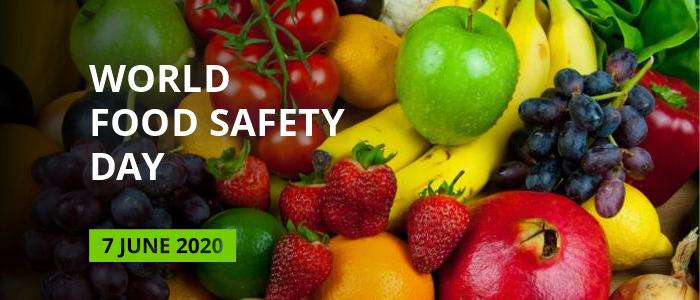
Today is the World Food Safety Day. The United Nations has declared 7th June and the World Food Safety Day, to strengthen global efforts to ensure food safety under the theme that Food Safety everyone’s business.
As food safety is a shared responsibility, the South Africa government calls on everyone, including food industry, farmers, scientific bodies, consumer bodies and the public, to join forces in the campaign to promote global food safety awareness.
The UN through the World Health Organization (WHO) and the Food and Agriculture Organization (FAO) has also joined the awareness campaign, through Codex Alimentarius Commission, to promote food safety and reduce the burden of foodborne diseases. As the world aim to end hunger, achieve food security and improved nutrition, as well as sustainable agriculture, food safety is integral to the attainment of the Sustainable Development Goals (SDGs)
The FAO has emphasized the fact that “There is no food security without food “. The WHO estimated “about 600 million people, i.e. almost 1 in 10 people in the world, who become ill after eating contaminated food which has led to about 420 000 deaths every year”. Unsafe food costs the developing countries about US$ 95 billion each year. This adds a strain on their health care systems.
The Department of Health, as a member of Codex Alimentarius Commission, an international food safety organization, has formed partnerships with relevant to engage the public in the following five steps on food safety and hygiene practices:
- Ensure it’s safe. As governments, the NDoH in collaboration with the Department of Agriculture, Land Reform and Rural Development (DALRRD) and National Regulator for Compulsory Specification (NRCS) has developed legislation, standards and guidance as measures to ensure safe and nutritious food for all. These measure are developed in consultation with all stakeholders
- Grow it safe. As government and through the DALRRD has facilitated and coordinated programmes to ensure implementation by food producers to adopt good agricultural practices. The agricultural sector also continuously works to improve hygiene practices in the handling of food to reduce foodborne illnesses
- Keep it safe. There is always a need for all Food Business Operators (FBO) to ensure compliance with existing safety measures for transportation, storage and preparation of food. We urge both FBOs and consumers to ensure and implement the core messages of the Five keys to safer food are:
‒ keep clean;
‒ separate raw and cooked;
‒ cook thoroughly;
‒ keep food at safe temperatures; and.
‒ use safe water and raw materials.
- Check it’s safe. Consumers need access to timely, clear and reliable information about the nutritional and disease risks associated with their food choices.
- Team up for safety. The governments are continuing to work together with the African Union, FAO WHO, food industry, scientific organizations, civil society, consumer and producer organisations, academic and research institutions in different platforms on food safety. The African Continental Free Trade Agreement (AfCFTA) and AU have noted food safety as a critical enabler in realizing the objectives of the agreement.
The Department of Health, in collaboration with food safety and food security stakeholders have been engaged in a number of activities for online and virtual platforms, including social media, as build up to this day. Food hygiene, like clean hands, can save lives and prevent foodborne health risks.



